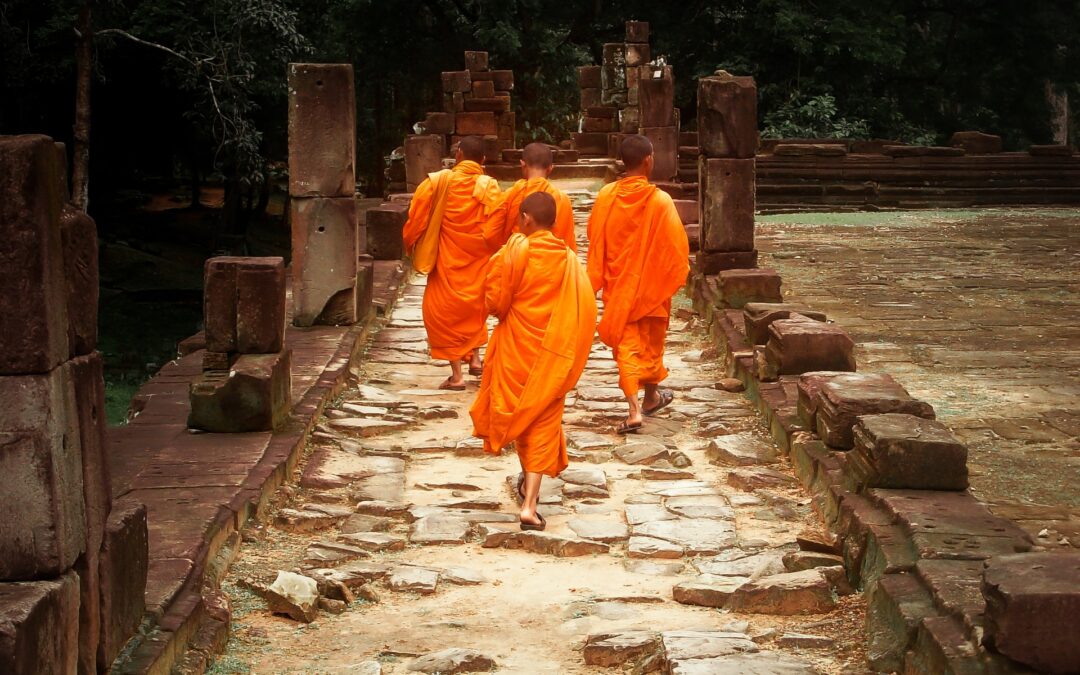Do you find yourself wishing that you could live free of anxiety, anger, bitterness, and the baggage that comes with life? In a recent episode of On Purpose, Jay Shetty takes us on a journey into the world of monks and explains how we can turn our world around if we learn to think like a monk.
Hindu monks use the foundational teachings from the Vedas and the Bhagavad Gita4. While these teachings have been traced back thousands of years, their message is still relevant today.
Jay Shetty believes we do not need to live like a monk to think like a monk.
“I’m not expecting any of you to start wearing robes, to shave your head, to move across the country or whatever it may be, or to leave your jobs and leave your lives,” he explained. “I want to help you access that stillness, that calm, that clarity from exactly where you are right now.”
Focus
Shifting focus from one thing to the next is something that most people deal with regularly. Distractions from our primary focus can cause anxiety and stress. So, how can we create more focus to become more impactful and useful in life?
“Monks are masters of focus,” Jay Shetty said. “If you learn this skill, you’ll be able to overcome your procrastination, overthinking, and all of those challenges that you face in creating the life you want. From a monk’s perspective, the greatest power is self-control – to train the mind and energy for total focus.
“Monks cultivate the ability to be detached and undeterred by external ups and downs,” Shetty shared. “They’re able to navigate anything that seems tough, challenging or even fun with the same amount of balance and stability without being too excited by pleasure or too depressed by pain.”
If you can train your mind to focus on the things you want without succumbing to the outside distractions, your brain will begin to change.
“Some research shows that even after just a few weeks of meditation, or in some cases a single session, our brains can start to change,” Jay Shetty shared. “If you’d like to learn to focus more so you can achieve your goals, work more productively, or be more present, you want to learn to think like a monk.”1-3
Self-Awareness
How well do you know yourself? What are your desires, your motivations? Do you care what others think of you? The world and its influences often become our desires and motivations without us even realizing what has happened. We become slaves to society’s view of what life should be, and we lose sight of what we desire it to be.
The second way you can live more like a monk, according to Jay Shetty, is to learn to connect with your true self and values.
“One of the things I learned in my monk training is to look at my conditioning to uncover my beliefs and where they came from so that I could discover the real me,” Shetty explained. “Projections heavily influence us, both those we have for ourselves and those others put on us.”
“Monks cultivate a deep relationship with themselves,” he continued. “They take time to determine their values, what’s important to them and what they want in life.”
Having the ability to create this relationship with yourself will help protect you from allowing others’ projections to affect your life.
Compassion
The third way to think like a monk is by learning compassion. Compassion often requires you to look at things from another point of view. It often means being mindful of what another person is going through. Compassion requires patience, kindness, thinking of others, and providing grace.
“Having greater compassion for others and ourselves helps us be more understanding and forgiving,” Jay Shetty explained. “It helps us stay more present and helps us manage difficult situations more easily.”
Research shows that those who practice compassion are better at dealing with difficult circumstances instead of falling apart under pressure.
Mindfulness
The fourth way you can think like a monk is by being mindful. Mindfulness is simply being aware of your thoughts and emotions. It allows you to be in touch with how you are feeling mentally and emotionally without judgment. Being mindful also allows you to be fully engaged in events and activities and gives you a more significant advantage to deal with adversities.
“Mindfulness dramatically increases the quality of your life,” Jay Shetty said. “It helps you be more focused, self-aware, and compassionate in addition to helping us manage fear and anxiety.”
Flipping your fears or anxieties from having power and control over you into pleasant thoughts can be vital in finding happiness.
“The next time you feel fear or anxiety, acknowledge them and invite them to tell you why they’re showing up,” Jay Shetty encouraged. “Then you can start to diffuse them. When we avoid something, it tends to magnify.”
Focus, self-awareness, compassion, and mindfulness are four principles that Jay Shetty expands upon in his new book, Think Like a Monk: Train Your Mind For Peace and Purpose Every Day. For more wisdom on these principles, and how you can apply them to live your life with greater peace and purpose every day, pre-order your copy at www.thinklikeamonkbook.com.
The original version of this article was originally published on Jay Shetty by Jay Shetty.

